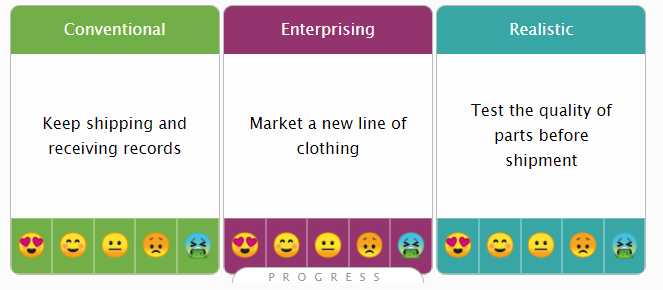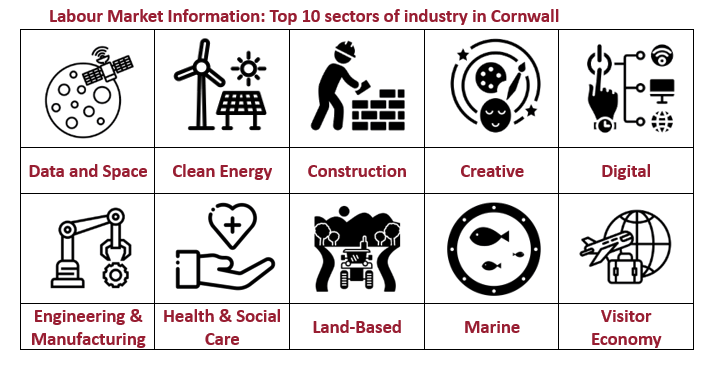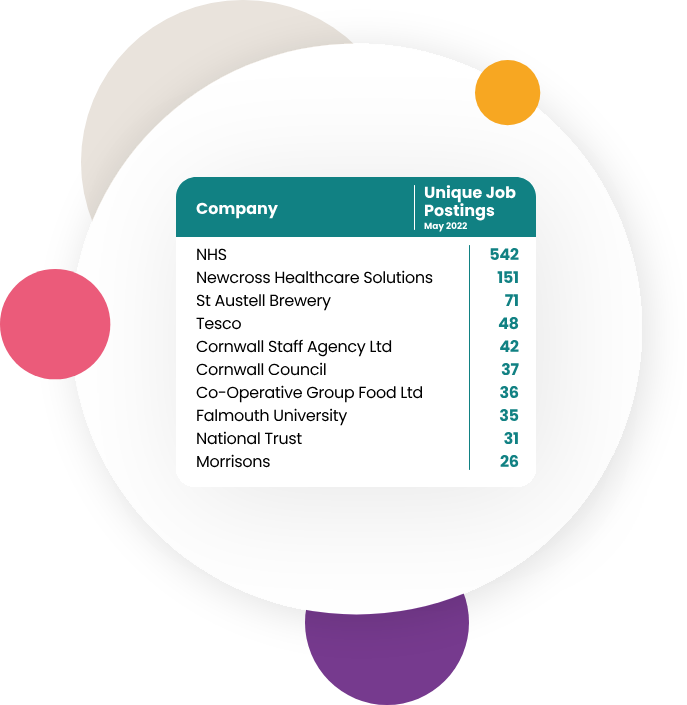- facebookShare this page on Facebook
- twitterTweet this page
- pinterestPin this page
Careers
Student Information
What is a career?
A job is a way of earning money but a career involves carefully planned steps that help you to progress within the industry or field (area of employment). A career can be one job or many jobs, one company or many companies. A career is sometimes called a "career path“, and includes education, training, and work experience.
How can I choose my career?
Consider what sector of industry or career you are interested in and explore job opportunities and pathways to get there, or consider what skills you have or the subjects you enjoy the most and explore related industries.
Drop into our Careers Hub in the LRC (Library) to explore your options.
There are lots of useful websites which have information and quizzes to help you:
Career Pilot: https://careerpilot.org.uk/job-sectors
Careerometer: https://www.careerpilot.org.uk/information/careerometer
Allows you to pick two jobs and compare the UK average salary, projected workforce change (is this a growing or declining industry?), linked jobs and more information about what the job involves and common tasks.
Skillsometer: https://www.lmiforall.org.uk/skillsometer/
You will be presented with a series of statements to help you discover what you might like to do in the future and help you discover what jobs you might like. Click on the emoji that shows how you feel about each statement, and you will be given suggestions of jobs linked to what you most enjoy doing. For example:

Investigative
Enterprising
Social
Conventional
Artistic
Realistic
Unifrog – coming soon!
Students and Parents will be able to access a new online platform which helps you to explore career pathways, develop employability skills and apply for further/higher education and employment opportunities.
Where can I get independent advice and guidance?
We have specially trained careers advisors to give you independent advice and guidance about options and career pathways.
Mrs Smith (Level 3)
Miss Anna-Aylin (Level 4)
Mrs Ali (Level 6 Careers 4U)

The Career Hub in the LRC is run by Mrs Smith, and is full of information, leaflets and books to support your careers choices and is open before school, break and lunchtimes and after school. You can use the computers to access careers websites or drop in and arrange a time to speak to Mrs Smith for a 1:1 discussion. Miss Anna-Aylin is also available if you would like a 1:1 discussion related to your options and career pathway.

Our Careers4U advisor is in school one or two days a week throughout the year seeing students in Key Stage 4. If you are in Year 9 and would like an appointment to see them or in any year and have a specific careers questions, please email careers4u@redruth.cornwall.sch.uk
In Years 7 and 8 you will have a 1:1 career discussion with your tutor to begin to explore your likes and dislikes.
In Year 9 you will have a 1:1 options interview with a member of the Senior Leadership Team (SLT) and a group or 1:1 careers interview with a careers advisor.
In Year 10 (or by the end of Year 11) you will have a 1:1 careers interview with a Careers4U careers advisor and a Post-16 interview with a member of SLT or an external guest from industry.
Students with EHCPs will have termly careers interviews with a CSW careers advisor.


What are my Post-16 Options (after GCSEs)?
The law requires all young people in England to continue in education or training until at least their 18th birthday, although in practice the vast majority of young peoplecontinue until the end of the academic year in which they turn 18. There are many options to continue education Post-16. These include:
- Academic qualifications: A-Levels or International Baccalaureate
- Vocational technical qualification (VTQs)s: BTECs, Cambridge Nationals or Technicals, T-Levels, Supported Internships (for SEND students with an EHCP)
- Apprenticeships: work and get paid, while doing off-the-job training
You can go to work, undertake voluntary work, become an intern or even set up your own business when you leave school. However, you’ll still need to be doing part-time training or study (the equivalent to at least one day a week) at the same time that leads to a regulated qualification, like a Vocational Technical Qualification (VTQ). This means that as well as gaining valuable experience, you’ll also gain a recognised accreditation that supports your future career.
https://www.skillsforcareers.education.gov.uk/your-training-options
Skills Map Tool https://yourskillsmap.com/skillsmapTool/
Post 16 Options Explained:
https://www.youtube.com/watch?v=PUrOFUbgw2g
Useful Weblink |
|||
Skills for Careers (Young People) |
https://www.skillsforcareers.education.gov.uk/pages/young-people |
||
|
Career Pilot |
|||
|
Find a Post 16 course, Degree or apprenticeship |
|||
|
How 2 Become … (Any Career) |
|||
|
CV Builder (Career Pilot) |
https://careerpilot.org.uk/information/a-job-or-career/cv-builder |
||
|
LifeSkills (Barclays) |
|||
Local Post-16 Providers |
|||
|
Cornwall College Group |
Includes: Bicton, Duchy, Eden Project, Falmouth Marine School, Newquay, St Austell, Stoke Climsland, Rosewarne, Plymouth Engineering Skills Centre, |
||
|
Truro and Penwith College |
|||
|
Callywith College |
|||
|
VI Academy 6th Form |
|||
Interested in an apprenticeship? |
|||
|
Apprenticeships |
|||
|
Amazing Apprenticeships and T-Levels |
|||
|
Find an Apprenticeship |
|||
|
Apprenticeships in Cornwall |
https://www.cornwall-opportunities.co.uk/opportunities/apprenticeships/ | ||
Considering going to university? |
|||
|
Degrees (UCAS) |
|||
|
Compare Universities |
|||
|
Russell Group Leading (Universities) |
|||
|
Falmouth University |
|||
|
Exeter University (Cornwall) |
|||
|
Plymouth University |
https://www.plymouth.ac.uk/ | ||
|
Not Going to Uni |
|||
SEND Support and Providers |
|||
|
Learn Your Way |
|||
What jobs are available now and in the future?
The world of work is continually changing, and you may wonder what future employment opportunities will look like. 10 years ago jobs like drone photographer, driverless car engineer and app developer did not even exist. Technology is changing fast and therefore so will jobs in the future. Also the ways of working are changing for example not all jobs are 9am– 5pm and many now have the flexibility of remote working.
|
Changes |
Future Employment Opportunities |
|
New technology being developed |
STEM (Science, Technology, Engineering and Maths), IT and Media. |
|
People are living longer |
Health and Social Care, Pharmaceuticals, Medical Research and Development and Leisure |
|
Skills levels are improving globally |
Education, Science, Creativity, Manufacturing and Finance |
|
The environment needs protecting |
Engineering (including motor vehicle), Chemical processing, Recycling, Agriculture, Energy and Utilities, Innovation. |
|
More concern for spending and well-being |
Health and Beauty, Sport and Leisure, Hospitality and Tourism, Creative and Media, Sales and Marketing. |
What will make me more employable?
The most in demand subjects and skills in the South West are:

(Source: https://www.dptcareershub.co.uk/bm2/)
How can Labour Market Information help with my choices?
Labour Market Information (LMI) is useful as it can tell you in your local area or for the UK
• The number of people in certain types of jobs
• Which industries are recruiting and where they are located
• What jobs and skills employers are looking for
• Growing or declining job areas and general employment trends
The majority of jobs available now and in future require at least level 2 (GCSE) and level 3 (A-Level or equivalent) qualifications but over 40% of UK jobs in 2020 will be for graduates. The more qualifications you have, the more jobs you can apply for. Most employers want someone who has at least five good GCSEs including English and maths, and often science too. If you have these and work experience then you have a good start into your career path.

Quick information
https://careershubcios.co.uk/wp-content/uploads/2023/05/LEP-LMI-A4-Posters.pdf
Labour Market Information: Top Ten Employers in Cornwall

(Source: https://peoplehub.info/labour-market-information/?view=all#lmi)


